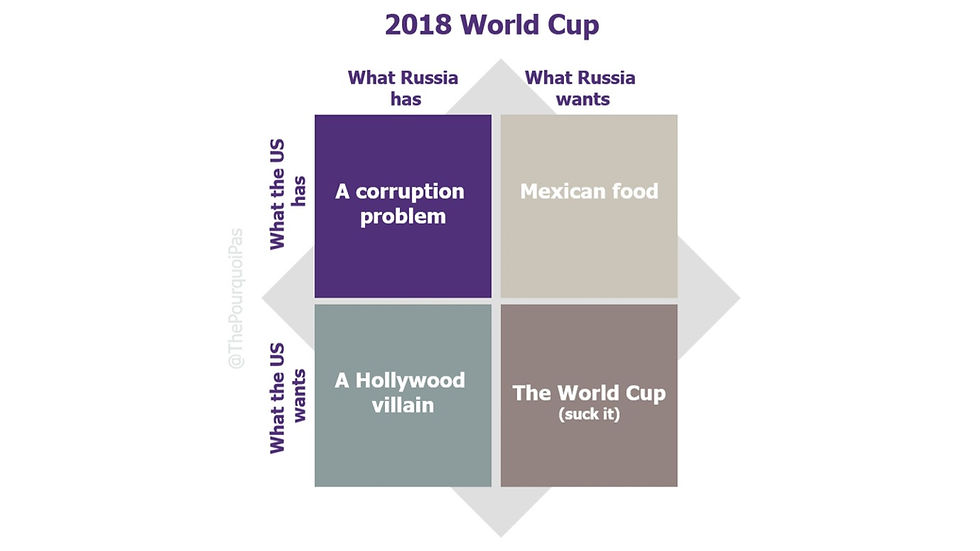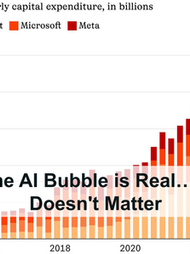Dancing With The Tsars : What Russia gains from the World Cup
- Adrien Book

- Jun 14, 2018
- 5 min read
Updated: Aug 21, 2020
Most will be aware that the FIFA World Cup is now well under way in Russia. We’ve already seen plenty of excitement from missed penalties, late-game screamers and underdog feel-good stories. For Russia however, the World Cup is about much more than sport. It’s a chance to show to the world the supposedly “new Russia”, one that may be beyond the idea that most people have of it. When the country won the right to host the competition, many really believed in a post-Soviet, global Russia.
That was however 8 years ago, and Putin has since come back to power, leading to deep changes in the face of renewed issues both at home and abroad. The word “issues” may be an understatement: over the past 4 years we’ve witnessed the annexation of Crimea, the war in Eastern Ukraine, numerous military interventions in Syria, the Sochi Olympics doping scandal, the downing of Malaysia Airlines Flight 17 and the poisoning of a former spy in England. Activists continue to die abroad mysteriously while those at home are jailed. More recently, Russia made “gay propaganda” illegal and weaponised social media to send western democracies spiraling nearly out of control.
Despite all this, the power of a World Cup is such that the few voices calling for a boycott have gone largely unheard and un-cared for. Say what you will about the FIFA, those guys know how to put butts in seats. Russia has spared no expense to get said butts into said seats: the competition cost taxpayers $11bn (683 billion rubles), which is vastly over budget. Going over budget is normal for both an international event and Russia (the Sochi Olympics cost $50bn), yet few will deny that many “expenses” come from Putin’s need to feed his “court”. Would he not do that, they may feed on him one day.
In fact, the economic impact of the competition is expected to be very limited. Most of the 12 stadiums built or expended for the competition are unlikely to get much use once the competition is over, and citywide renovations have been superficial. The impact over internal politics will also be negligible: Putin’s approval ratings are so high that the World Cup is unlikely to move the needle above their longtime 85% point. Equally, it’s unlikely to influence his detractors overseas.
So what gives? Why is this event so important to Putin?
What’s at stake here is primarily international clout and goodwill, regardless of the score at the end of the month. We often forget that the U.S is seen as the enemy of numerous regions of the world (sometimes rightly — the sound of drones and “collateral damage” makes for lousy nursery rhymes), and to that extent Putin’s Russia looks to provide a powerful counter-balance of power. The World Cup is the perfect time to cement that idea by providing the positive image of a modern Russia.
In fact, a World Cup where the U.S team is nowhere to be found and billions of people watch Russia beat the Saudis 5–0 is a powerful metaphor for current international politics.
The U.S has turned America First into America Alone by alienating most of its allies, and the international community has been unable to have a positive impact on many crises currently going on. Trump’s demand of the re-creation of the G8 is just the cherry on top, though one must assume Putin regularly wakes up with the immortal words of Victor Frankenstein ringing in his ears : “I have been the author of unalterable evils, and I live in daily fear lest the monster whom I created should perpetrate some new wickedness”.
Greek, Hungarian, Italian and Austrian populist leaders have recently cosied up to Mr. Putin, as have Angela Merkel of Germany and Emmanuel Macron of France when discussing the future of the Iran deal, among other issues. There are few popular geopolitical clubs Russia is a part of, and despite showing the image of proud loner, it is no doubt enjoying being once more a part of any international community. To that extent, every victory on the field will be like winning a small war with regards to said international community’s view of the embattled nation.
Yet, Russia and the Russian government are not synonymous, and it will be interesting to see if, beyond international goodwill, the competition can unite the famously tortuous and divided Russian soul, best defined by a natural kindness of heart, simplicity and resignation (never thought I’d ever be able to link de Vogüé, Turgenev and Nietzsche in one sentence). Russia is a complicated nation, filled with contradictions and oxymora. Its people are proud of its history, yet fear it. It is at times comprehensively unwelcoming, yet incredibly beautiful. Its people love the homeland, but the homeland doesn’t necessarily love them back, perhaps best exemplified by the fact that Moscow is using the World Cup to kick off its 5G efforts, implementing hot spots so that a lucky view may watch the game using virtual reality headsets, while the rest of the nation must make do with Potemkin villages.
Will the Russian people take kindly to the 1M foreigners who are expected to visit Russia over the next month, taking advantage of simplified visa procedures? Such an influx of people is likely to have an effect on the Russian population, who might become inclined to reflect on their situation, and even potentially lead them to further openness. To cater for all these visitors, Russia has organised classes on how to smile (for bus and train drivers) and encouraged taxi drivers to say “khello”. It will be interesting to see if panem et circensis will be enough to make them forget about the economic uncertainty the nation faces when faced with the tourists’ wealth.
Any such movement may be hard to achieve if some members of the Russian Federal Assembly get their way. One member advised Russian women against fraternising with foreign men (as a Frenchman married to a Russian, this gave me a good laugh), especially if they were from a different race, as it would increase the risk of children being raised in single-parent homes. Another cautioned against hugging visitors, because you know, diseases. There is however hope, though it is widely under-reported: one parliament member sought to downplay his colleagues’ statements, claiming that any children born out of a World Cup romance “will remember that their parents’ love story started here in Russia.” He went on to hope “that the World Cup will give [Russia] many love stories, interracial couples and children.”
That’s a beautiful sentiment.
All countries defy easy definition, and Russia more than most. What’s sure is that Russia is not some sort of unstoppable dark state. It aches just like the rest of us, though often less publicly. Its political class is out of touch, and protests have become regular, as real incomes have fallen 12% over the past three years. The center of discussion in Moscow nowadays is not a the cost of a new Death Star, but the launch of facial recognition for its city-wide camera network. Russia has about the same ratio of good to bad people as anywhere else. And just like anywhere else, its government naturally puts its oxygen mask on first before helping others. Sounds awful, but as Churchill said, “it’s the worst form of government, except all the others”.
Once the fans depart later this summer, the realities of the Russian economy will remain, as will the many geopolitical conflicts Russia is tied to. The beautiful game can offer only a temporary respite from ugly realities. Yet, one may hope that, even as we enjoy the thrills of this unique competition, we don’t forget and forsake the many ordinary citizens fighting for social progress, often within scoring distance of the stadiums.



























Click here provide members with discounts on over-the-counter medications, vitamins, and health essentials, promoting better health management and cost-effective wellness solutions. kaiserotcbenefits.com - more details here
Click here help you find recent death notices, providing information about funeral services, memorials, and tributes for loved ones in your area. obituariesnearme.com - more details here
Click here? Many users have had mixed experiences with the platform, so it's important to read reviews and verify deals before booking. istravelurolegit.com - more details here
무료카지노 무료카지노;
무료카지노 무료카지노;
google 优化 seo技术+jingcheng-seo.com+秒收录;
Fortune Tiger Fortune Tiger;
Fortune Tiger Fortune Tiger;
Fortune Tiger Slots Fortune…
站群/ 站群
gamesimes gamesimes;
03topgame 03topgame
EPS Machine EPS Cutting…
EPS Machine EPS and…
EPP Machine EPP Shape…
Fortune Tiger Fortune Tiger;
EPS Machine EPS and…
betwin betwin;
777 777;
slots slots;
Fortune Tiger Fortune Tiger;
google 优化 seo技术+jingcheng-seo.com+秒收录;
谷歌seo优化 谷歌SEO优化+外链发布+权重提升;
Fortune Tiger Fortune Tiger;
Fortune Tiger Fortune Tiger;
Fortune Tiger Fortune Tiger;
Fortune Tiger Slots Fortune…
gamesimes gamesimes;
站群/ 站群
03topgame 03topgame
betwin betwin;
777 777;
slots slots;
Fortune Tiger Fortune Tiger;
google seo…
Fortune Tiger…
Fortune Tiger…
Fortune Tiger…
Android Android
software software
Q&A Q&A
Notícias Notícias
sitemap sitemap;
sitemap sitemap;
谷歌seo推广 游戏出海seo,引流,快排,蜘蛛池租售;
Fortune Tiger Fortune Tiger;
Fortune Tiger Fortune Tiger;
Fortune Tiger Fortune Tiger;
Fortune Tiger Fortune Tiger;
Fortune Tiger Slots Fortune Tiger Slots;